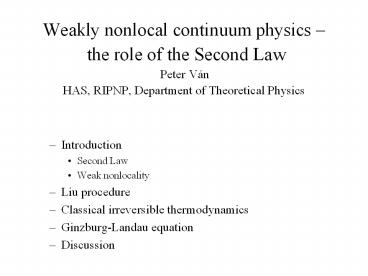Weakly nonlocal continuum physics - PowerPoint PPT Presentation
Title:
Weakly nonlocal continuum physics
Description:
general framework of any. Thermodynamics (?) macroscopic. continuum. theories. Thermodynamics science of macroscopic. energy changes. Thermodynamics. science of ... – PowerPoint PPT presentation
Number of Views:62
Avg rating:3.0/5.0
Title: Weakly nonlocal continuum physics
1
Weakly nonlocal continuum physics the role of
the Second Law Peter Ván HAS, RIPNP,
Department of Theoretical Physics
- Introduction
- Second Law
- Weak nonlocality
- Liu procedure
- Classical irreversible thermodynamics
- Ginzburg-Landau equation
- Discussion
2
Nonequilibrium thermodynamics
- Thermodynamics
science of temperature
Thermodynamics science of macroscopic
energy changes
general framework of any Thermodynamics
(?) macroscopic continuum theories
- General framework
- Second Law
- fundamental balances
- objectivity - frame indifference
reversibility special limit
3
Thermo-Dynamic theory
Evolution equation
1 Statics (equilibrium properties)
2 Dynamics
4
1 2 closed system
S is a Ljapunov function of the equilibrium of
the dynamic law
Constructive application
force
current
5
Classical evolution equations balances
constitutive assumptions
Fourier heat conduction
Dgt0
Not so classical evolution equations balances
(?) constitutive assumptions
Ginzburg-Landau equation relaxation
nonlocality
lgt0, kgt0
6
Nonlocalities
Restrictions from the Second Law. change of the
entropy current change of the entropy
Change of the constitutive space
7
Basic state, constitutive state and constitutive
functions
Heat conduction Irreversible Thermodynamics
1)
- basic state
- (wanted field T(e))
- constitutive state
- constitutive functions
Fourier heat conduction
But
Guyer-Krumhansl
Cattaneo-Vernote
???
8
Fluid mechanics
2)
- basic state
- constitutive state
- constitutive function
Local state Euler equation
Nonlocal extension - Navier-Stokes equation
But
Korteweg fluid
9
Internal variable
3)
- basic state
- constitutive state
- constitutive function
A) Local state - relaxation
B) Nonlocal extension - Ginzburg-Landau
e.g.
10
Irreversible thermodynamics traditional
approach
- basic state
- constitutive state
- constitutive functions
J
Solution!
currents and forces
Heat conduction ae
11
Second Law
basic balances
- basic state
- constitutive state
- constitutive functions
Second law
(universality)
Constitutive theory balances are constraints
Method Liu procedure
12
Liu procedure
LEMMA (FARKAS, 1896) Let Ai ? 0 be independent
vectors in a finite dimensional vector space V, i
1...n, and S p ?V pAi 0, i
1...n. The following statements are equivalent
for a b ? V (i) pB 0, for all p ? S. (ii)
There are non-negative real numbers ?1,..., ?n
such that
Vocabulary elements of V independent
variables, V the space of independent
variables, Inequalities in S
constraints, ?i Lagrange-Farkas multipliers.
13
Usage
A1
B
14
Proof S is not empty. In fact, for all k, i
?1,..., n there is a such that pkAk 1 and
pkAi 0 if i ? k. Evidently pk?S for all
k. (ii) ? (i)
if p? S. (i) ? (ii) Let S0 y?V
y Ai 0, i 1...n. Clearly Ø? S0 ? S. If y?
S0 then -y is also in S0, therefore yB 0 and
-yB 0 together. Therefore for all y? S0 it is
true that yB 0. As a consequence B is in the
set generated by Ai, that is, there are real
numbers ?1,..., ?n such that B .
These numbers are non- negative, because with
the previously defined pk? S, is
valid for all k. QED
15
Vocabulary Final equality Liu
equations Final inequality residual
(dissipation) inequality.
16
Usage
17
Irreversible thermodynamics beyond traditional
approach
- basic state
- constitutive state
- constitutive functions
Liu and Müller validity in every time and
space points, derivatives of C are independent
18
A) Liu equations
solution
B) Dissipation inequality
Spec Heat conduction ae
A)
B)
19
What is explained The origin of Clausius-Duhem
inequality - form of the entropy current -
what depends on what Conditions of
applicability!! - the key is the constitutive
space
Logical reduction the number of independent
physical assumptions! Mathematician ok
but Physicist no need of such thinking, I
am satisfied well and used to my analogies no
need of thermodynamics in general Engineer con
sequences?? Philosopher
Popper, Lakatos excellent, in this way we can
refute
20
Weakly nonlocal internal variables
Ginzburg-Landau (variational)
- Variational (!)
- Second Law?
21
Ginzburg-Landau (thermodynamic, relocalized)
constitutive state space
constitutive functions
local state
Liu procedure (Farkass lemma)
?
22
current multiplier
isotropy
23
Ginzburg-Landau (thermodynamic, non relocalizable)
state space
constitutive functions
Liu procedure (Farkass lemma)
24
- Discussion
- Applications
- heat conduction, one component fluid
(Schrödinger-Madelung, ), two component fluids
(sand), complex Ginzburg-Landau, , weakly
non-local statistical physics, - ? Cahn-Hilliard, Korteweg-de Vries, mechanics
(hyperstress), - Dynamic stability, Ljapunov function???
- Universality independent on the micro-modell
- Constructivity Liu force-current systems
- Variational principles an explanation
- Second Law
25
References Discrete, stability T. Matolcsi
Ordinary thermodynamics, Publishing House of the
Hungarian Academy of Sciences, Budapest,
2005. Liu procedure Liu, I-Shih, Method of
Lagrange Multipliers for Exploitation of the
Entropy Principle, Archive of Rational Mechanics
and Analysis, 1972, 46, p131-148. Weakly
nonlocal Ván, P., Exploiting the Second Law in
weakly nonlocal continuum physics, Periodica
Polytechnica, Ser. Mechanical Engineering, 2005,
49/1, p79-94, (cond-mat/0210402/ver3). Ván, P.
and Fülöp, T., Weakly nonlocal fluid mechanics -
the Schrödinger equation, Proceedings of the
Royal Society, London A, 2006, 462, p541-557,
(quant-ph/0304062). Ván, P., Weakly nonlocal
continuum theories of granular media
restrictions from the Second Law, International
Journal of Solids and Structures, 2004, 41/21,
p5921-5927, (cond-mat/0310520).
26
Thank you for your attention!





























![L 34 Modern Physics [1] PowerPoint PPT Presentation](https://s3.amazonaws.com/images.powershow.com/7125701.th0.jpg?_=20150905079)

![L 33 Modern Physics [1] PowerPoint PPT Presentation](https://s3.amazonaws.com/images.powershow.com/7602675.th0.jpg?_=201602121011)